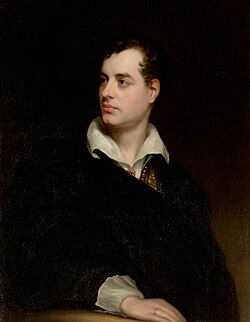George Gordon Byron Quote
I know that two and two make four - and should be glad to prove it too if I could - though I must say if by any sort of process I could convert 2 and 2 into five it would give me much greater pleasure.
George Gordon Byron
I know that two and two make four - and should be glad to prove it too if I could - though I must say if by any sort of process I could convert 2 and 2 into five it would give me much greater pleasure.
Related Quotes
Heresy would like to think of itself as 'invented Truth'. But of course, all Reason and Logic would agree that no man can ever create Truth; he can only discover it. If heresy were ever at all benefic...
Criss Jami
Tags:
answers, apologetics, argumentation, beliefs, church, create, deceit, definition, discovery, doctrine
One of the difficulties in raising public concern over the very severe threats of global warming is that 40 percent of the US population does not see why it is a problem, since Christ is returning in...
Noam Chomsky
Tags:
advancement, apocalypse, atheism, bible, climate, climate change, consensus, deism, global warming, ignorance
About George Gordon Byron
George Gordon Byron, 6th Baron Byron (22 January 1788 – 19 April 1824) was an English poet. He is one of the major figures of the Romantic movement, and is regarded as being among the greatest poets of the United Kingdom. Among his best-known works are the lengthy narratives Don Juan and Childe Harold's Pilgrimage; many of his shorter lyrics in Hebrew Melodies also became popular.
Byron was educated at Trinity College, Cambridge, before he travelled extensively in Europe. He lived for seven years in Italy, in Venice, Ravenna,
Pisa and Genoa after he was forced to flee England due to threats of lynching. During his stay in Italy, he would frequently visit his friend and fellow poet Percy Bysshe Shelley. Later in life, Byron joined the Greek War of Independence to fight the Ottoman Empire, for which Greeks revere him as a folk hero. He died leading a campaign in 1824, at the age of 36, from a fever contracted after the first and second sieges of Missolonghi.
His one child conceived within marriage, Ada Lovelace, was a founding figure in the field of computer programming based on her notes for Charles Babbage's Analytical Engine. Byron's extramarital children include Allegra Byron, who died in childhood, and possibly Elizabeth Medora Leigh, daughter of his half-sister Augusta Leigh.
Byron was educated at Trinity College, Cambridge, before he travelled extensively in Europe. He lived for seven years in Italy, in Venice, Ravenna,
Pisa and Genoa after he was forced to flee England due to threats of lynching. During his stay in Italy, he would frequently visit his friend and fellow poet Percy Bysshe Shelley. Later in life, Byron joined the Greek War of Independence to fight the Ottoman Empire, for which Greeks revere him as a folk hero. He died leading a campaign in 1824, at the age of 36, from a fever contracted after the first and second sieges of Missolonghi.
His one child conceived within marriage, Ada Lovelace, was a founding figure in the field of computer programming based on her notes for Charles Babbage's Analytical Engine. Byron's extramarital children include Allegra Byron, who died in childhood, and possibly Elizabeth Medora Leigh, daughter of his half-sister Augusta Leigh.
